Key takeaways:
- Narrowing focus in game projects helps manage complexity and enhances enjoyment, similar to adjusting a camera lens for clarity.
- Creating an organized and personalized workspace significantly boosts concentration and productivity.
- Implementing structured time management techniques, like the Pomodoro Technique, prevents burnout and enhances focus during coding tasks.
- Establishing a dedicated workspace and practicing mindfulness can improve focus by minimizing distractions and sharpening mental clarity.
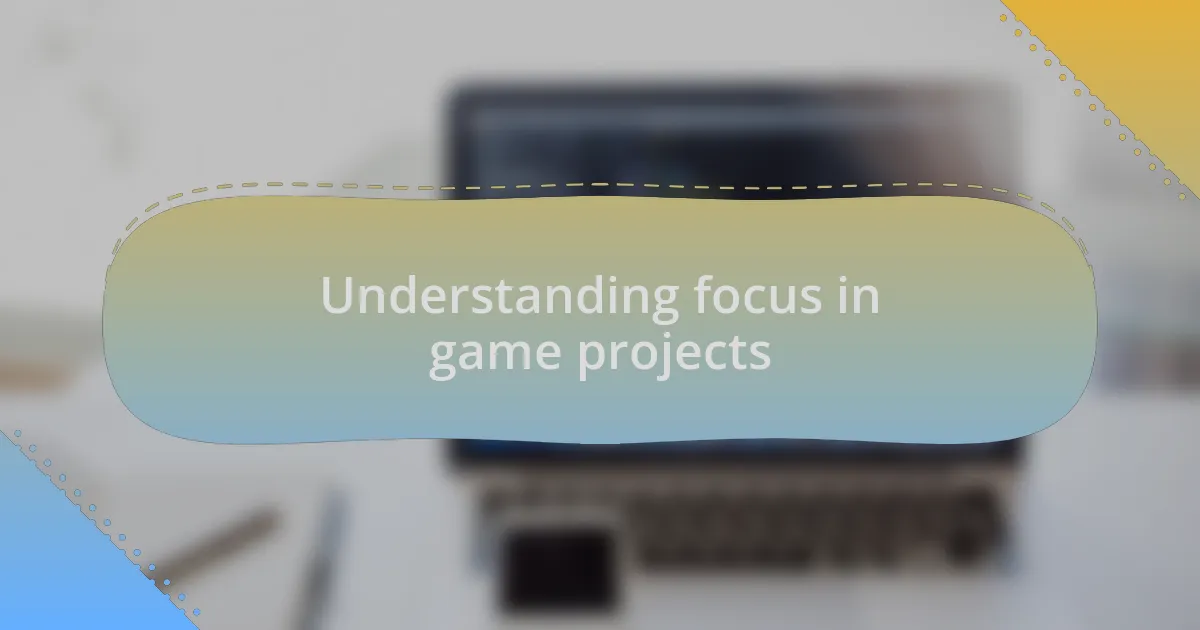
Understanding focus in game projects
Understanding focus in game projects often means recognizing what truly captures your attention and passion. I remember when I first started a project that seemed to stretch in a dozen different directions. Each new idea felt exciting, but it soon became overwhelming. Have you experienced that? It’s a common scenario where the initial spark can lead to confusion if not grounded in a clear vision.
When I narrow down my focus, I often think of it like honing a camera lens. Only when I adjust the settings can I see the details that matter. For instance, while developing an indie game, I realized that concentrating on core mechanics rather than trying to infuse every trendy feature made the project not only more manageable but also more enjoyable. Isn’t it ironic how less can sometimes turn out to be so much more?
Reducing distractions is crucial in maintaining focus. I’ve found that creating an environment conducive to deep work aids significantly. For example, minimizing notifications and setting specific work hours helps me dive deeper into my projects. This focused time allows me to explore concepts without the constant pull of multitasking, which can be detrimental to creativity and productivity. How do you create a space that allows you to stay truly immersed in your work?
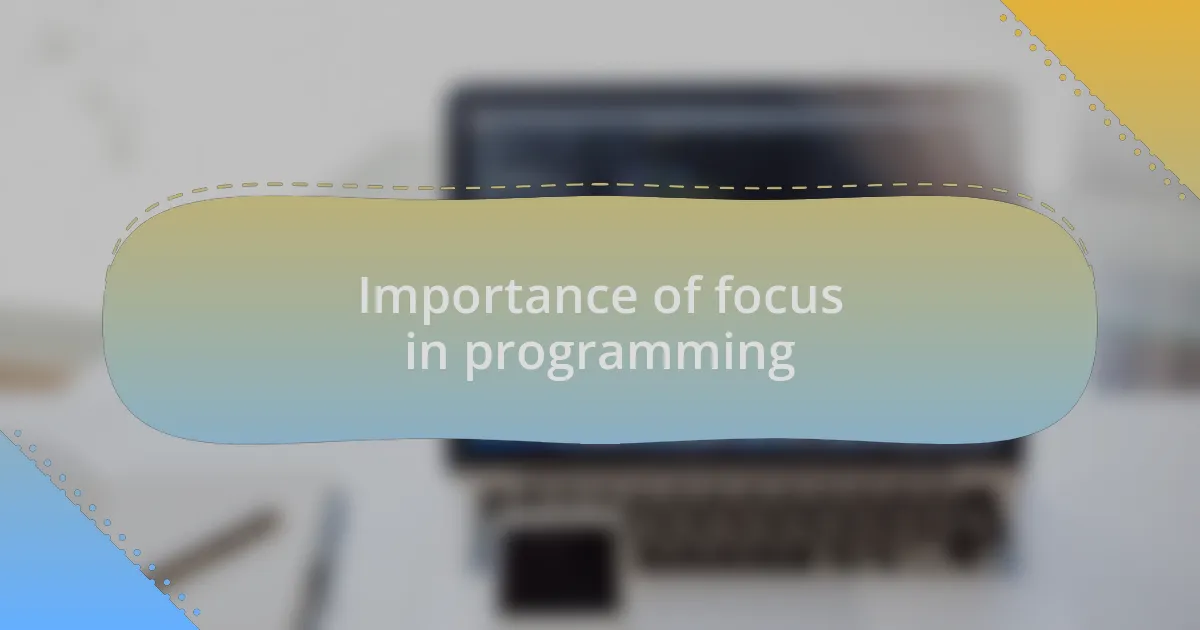
Importance of focus in programming
Focusing on programming is essential, as it directly impacts your productivity and the quality of your work. I remember getting wrapped up in minor details while coding, only to realize that I was missing the bigger picture. Have you ever felt that moment of clarity when you shift your attention back to the main objective? It’s energizing because it allows for deeper exploration and innovation.
When I concentrate on a single task, I find that the code flows more easily, and I make fewer mistakes. There’s a sense of satisfaction in seeing a coherent project come together. It’s like tuning an instrument; each line of code contributes to a harmonious outcome. Without that focus, the melody of the project can quickly become dissonant and chaotic, leading to frustration and delays.
The emotional rollercoaster of programming can be daunting, but maintaining focus helps to manage that ride. I find that when I allow myself to get sidetracked, it creates waves of anxiety and self-doubt. Instead, I prioritize a focused mindset, reminding myself that perseverance during difficult coding sessions ultimately pays off. How do you remind yourself of this when distractions arise?
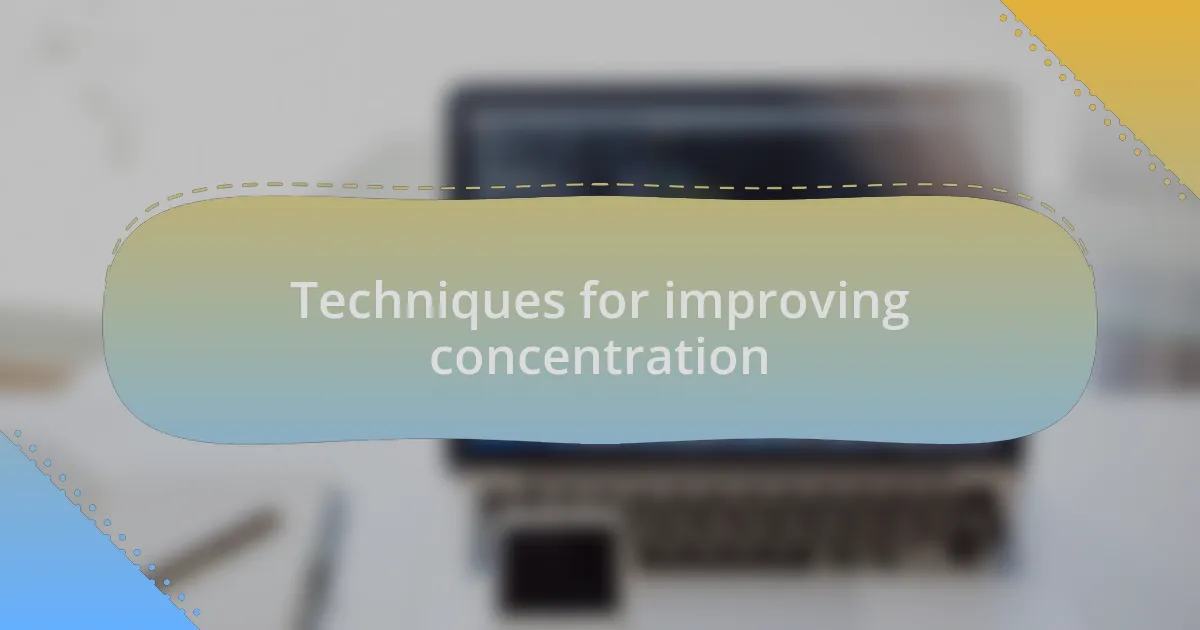
Techniques for improving concentration
Being intentional about my workspace has proven to be a game changer for my concentration. When I tidy up my desk, it somehow clears my mind too. I often ask myself, “What distractions can I eliminate today?” You would be surprised how a simple declutter can enhance my ability to dive deep into coding challenges.
Another technique I love is setting specific time blocks for focused work. I use a timer to dedicate 25 minutes to writing code, followed by a 5-minute break. This method, known as the Pomodoro Technique, really helps me maintain high levels of focus. Have you ever noticed how a ticking timer can create a sense of urgency that actually boosts your productivity? I certainly have, and it makes each coding session feel more purposeful.
Lastly, I find that incorporating music or ambient sounds tailored for focus significantly boosts my concentration. I’ve experimented with different genres, from instrumental to nature sounds, and each affects my mood uniquely. Why does music soothe the programming process? For me, it establishes a rhythm that accompanies my thought flow, making even the most complex coding tasks feel less daunting.
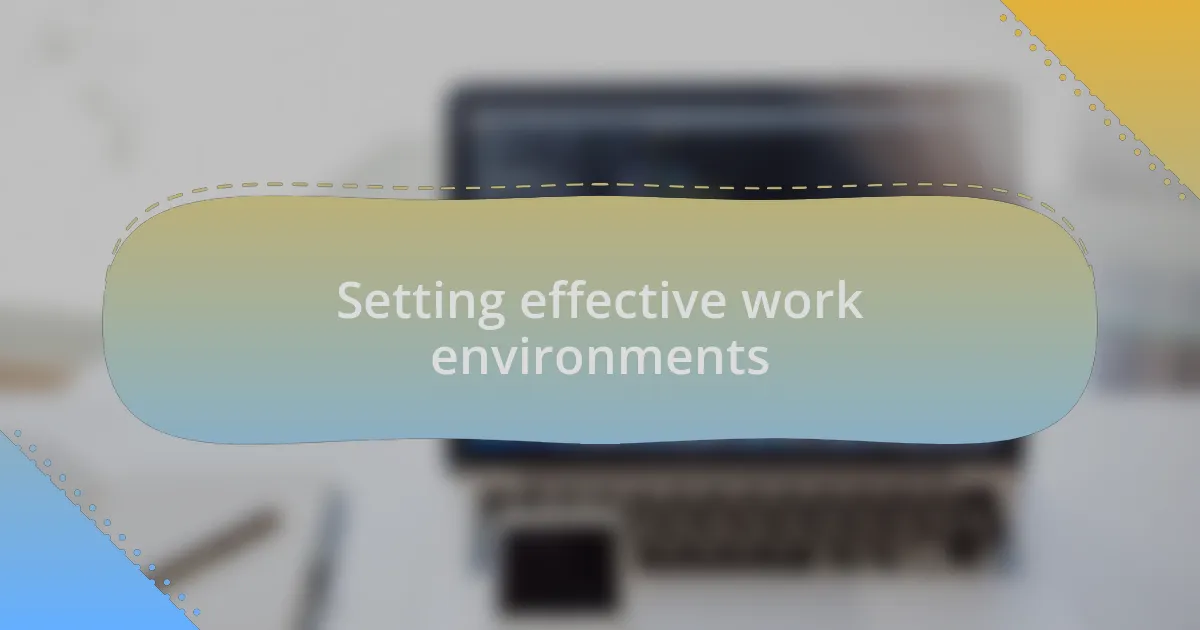
Setting effective work environments
Creating an effective work environment is something I prioritize to enhance my focus. The lighting in my workspace plays a critical role; I prefer natural light or soft, warm bulbs that create a cozy feel. Have you ever noticed how harsh fluorescent lights can drain your energy? Soft lighting helps me to feel more at ease, which in turn, allows my mind to concentrate better on the programming tasks ahead.
Another aspect I’ve found crucial is the arrangement of my desk. I ensure that my most-used tools are within arm’s reach, which minimizes the time I spend searching for things. One time, I realized I was wasting precious minutes rummaging through cords and paperwork, and it dawned on me that an organized space directly correlates with an organized mind. When everything is in its place, I can jump straight into problem-solving without the mental clutter.
Additionally, I’ve learned the importance of personalizing my workspace with elements that inspire me. Whether it’s a few framed artwork pieces or a small plant, these personal touches remind me of my goals and passions. Do you have pieces that resonate with your journey? For me, these elements act as motivators, fueling my drive to work on my game projects with enthusiasm and clarity.
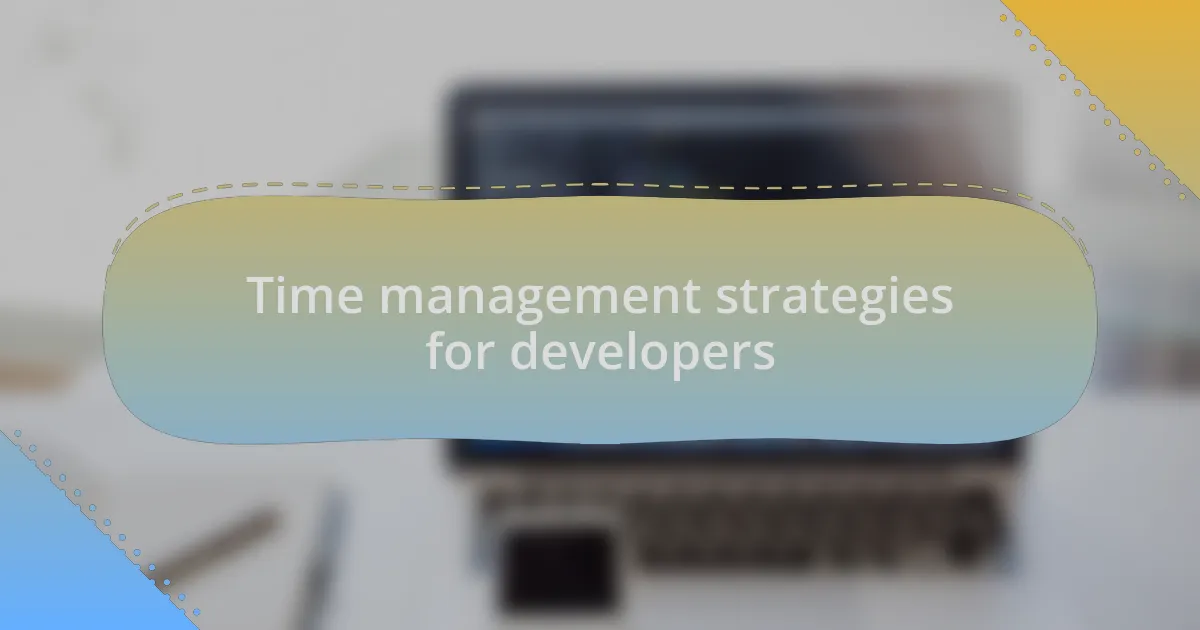
Time management strategies for developers
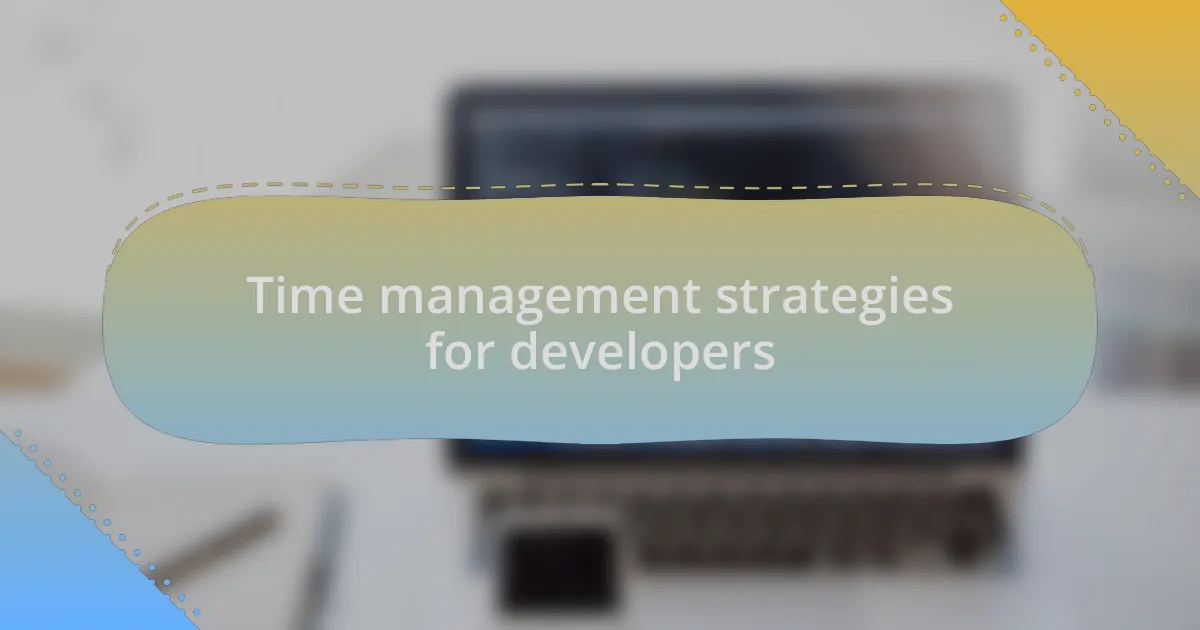
Time management strategies for developers
I’ve discovered that setting specific time blocks for coding can work wonders in enhancing my productivity. Just the other day, I set aside a focused two-hour window to delve into a complex game mechanic I was developing. Breaking my work into manageable chunks kept me motivated and prevented burnout—have you ever noticed how a focused period can make complex problems seem simpler?
Another tactic I’ve integrated into my routine is using techniques like the Pomodoro Technique, which involves working for 25 minutes followed by a 5-minute break. I remember implementing this during a hectic week filled with deadlines; those small breaks genuinely recharged my creativity and focus. It’s fascinating how giving ourselves permission to step away, even briefly, can lead to “aha” moments when we return to our work!
I also find it helpful to prioritize tasks using a simple to-do list. Each morning, I jot down my top three priorities based on urgency and importance, and that clarity drives my entire day. One time, I faced a project that seemed overwhelmingly complex, but breaking it down into bite-sized tasks transformed my anxiety into manageable action steps. Have you tried something similar? It’s amazing how clarity can shift your mindset and lead to significant progress.
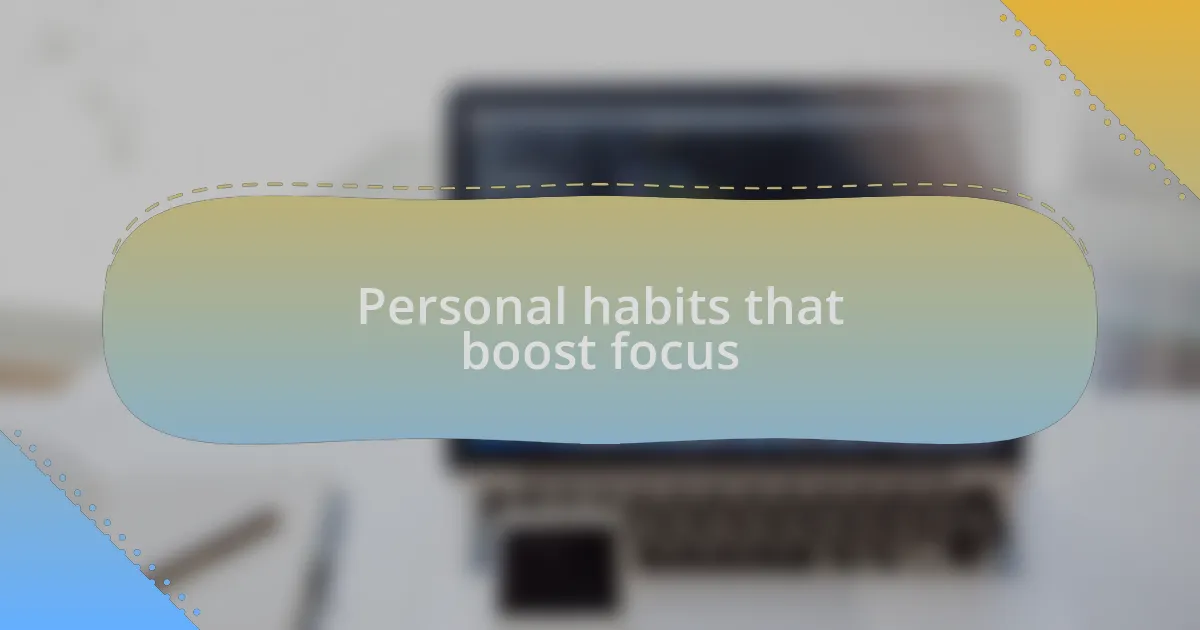
Personal habits that boost focus
One personal habit that significantly enhances my focus is establishing a dedicated workspace free from distractions. I remember when I used to work from the living room, only to be interrupted by the TV or family chatter. Once I set up a specific area just for development, it felt like my brain could switch into “work mode” much more easily. Have you ever tried designating a specific space for focused tasks? It can make a world of difference.
Another habit that I’ve embraced is the art of mindfulness meditation, which I practice for just a few minutes each day. I often find that taking a moment to breathe and clear my mind before diving into a project sharpens my concentration. I recall a particularly chaotic day when everything felt overwhelming; taking that brief pause gave me the clarity to tackle my tasks with renewed energy. How often do we overlook the power of stillness in our busy lives?
Incorporating regular physical activity into my routine has also played a crucial role in maintaining my focus. On days when I can squeeze in a run or even a brisk walk, I return to my projects feeling refreshed and more mentally agile. I vividly recall how a short jog around the block helped me break through a creative block while designing a level in my game. It’s interesting how a bit of movement can trigger those lightbulb moments, isn’t it?
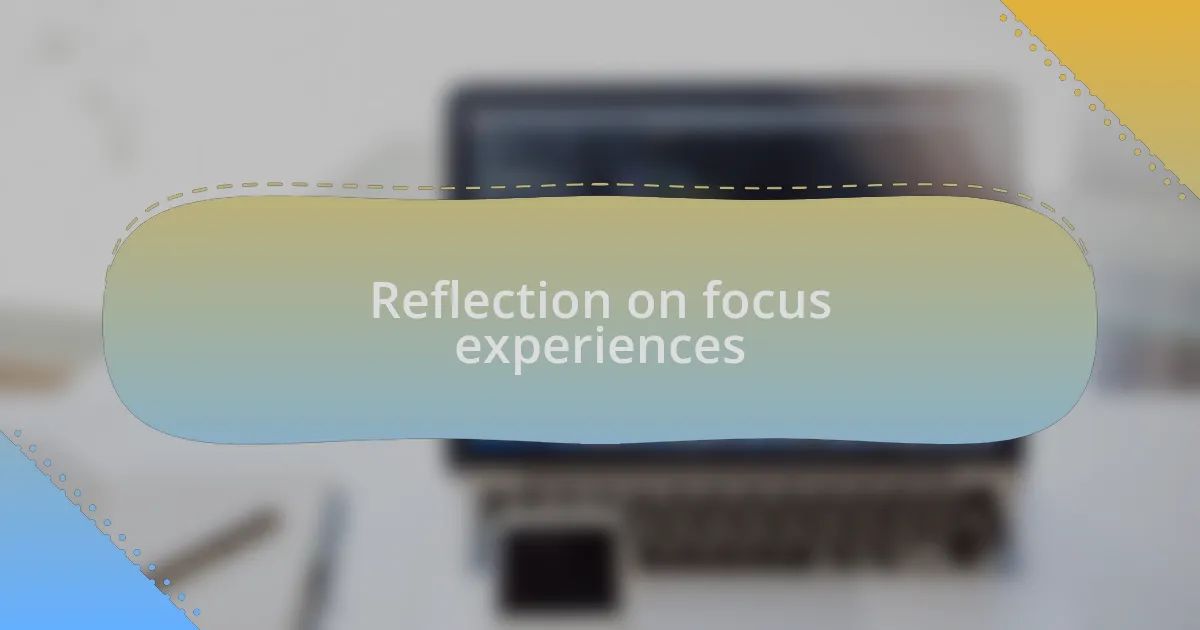
Reflection on focus experiences
When I reflect on my focus experiences during game projects, I can’t help but think of the times when distractions threatened to derail my progress. I remember sitting in front of my screen, deep into coding a vital level, only to be interrupted by notifications. It was frustrating, and I realized I wasn’t just losing focus—I was losing passion for the project. Have you ever felt that shift? Finding ways to manage those interruptions became essential for me.
One thing I learned through trial and error is the importance of setting clear goals for each work session. There was a day when I decided to list out my tasks before starting. Surprisingly, it transformed my productivity. Each time I completed a task, I felt a surge of accomplishment. Isn’t it fascinating how small victories can build momentum? It reinforced my belief that clarity in purpose not only directs focus but also feeds motivation.
I also found that timing plays a significant role in my focus. I used to think I could power through late nights, but I often ended up drained and less effective. Now, I prioritize working during my personal peak productivity hours. For instance, I recall a particularly fruitful morning where I mapped out an entire game level. The energy was there, and I was in my element—this taught me the value of working with my rhythm, rather than against it. Do you know what times work best for you? Tuning into your natural energy flow can indeed be a game-changer.